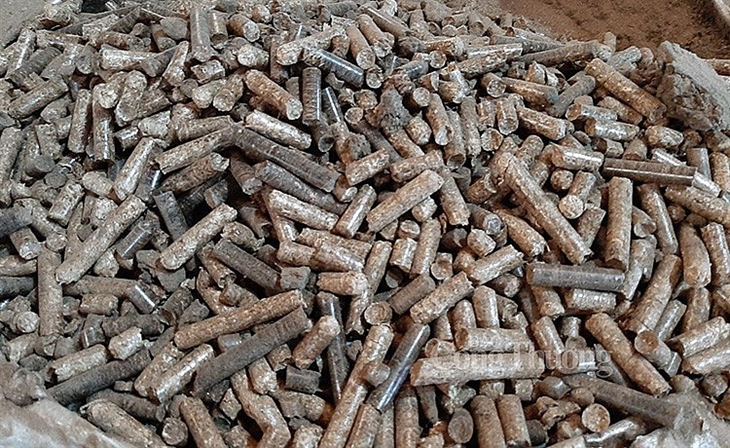In 2023: Wood pellet export earned nearly 680 million USD
Friday, March 15,2024
AsemconnectVietnam - In 2023, wood pellet exports earned nearly 680 million USD. The Japanese market is considered to continue to play an important role in Vietnam's wood pellet industry
Wood pellet exports increased in Japan and EU but decreased in Korea
In 2022, wood pellet exports increased very strongly with an export volume of approximately 4.9 million tonnes, a turnover of nearly 790 million USD, nearly doubling compared to 2021 due to high wood pellet prices. However, in 2023, wood pellet export turnover decreased slightly in volume, reaching more than 4.6 million tonnes (down 4.3% compared to 2022) with a value of nearly 680 million USD (down 13.7% compared to 2022).
Compared to the record price increase in 2022, average export price of wood pellet in 2023 has decreased to approximately 145.5 USD/tonne (down 9.7% compared to 2022). Wood pellet prices continued to decrease from nearly 190 USD/tonne at the end of 2022 to only approximately 135-140 USD/tonne in April 2023.
Korea and Japan are still Vietnam's two largest wood pellet import markets, accounting for 96% of the total volume and 96.6% of the country's total wood pellet export turnover.
However, export situation to these two markets had opposite developments in 2023. Japan imported more than 2.8 million tonnes, equivalent to more than 438 million USD (an increase of 12.4% in volume and 14.3% in value compared to 2022). Meanwhile, Korea imported just over 1.7 million tonnes of wood pellets, worth nearly 214 million USD (down 24.5% in volume and 43.3% in value compared to 2022).
The reason is because Korean businesses have other sources of supply, such as cheap price wood pellet from Russia.
EU market, although only accounting for a small proportion of Vietnam's wood pellet export(3.3% of total volume and 3.8% of total turnover), is on the rise. In 2023, EU imports more than 155,000 tonnes, reaching approximately 26 million USD (an increase of nearly 3 foldtimes in volume and 3.7 foldtimes in value compared to 2022).
Export price of woodpellets in 2023 to Japanese and Korean markets decreased significantly compared to the end of 2022. However, amplitude of decline in Korean market is much larger than that of Japan.
Specifically, as of December 2023, export price of wood pellet to Korea is just under 105 USD/tonne, down 43% compared to the peak of 185 USD/tonne in December 2022. In contrast, export price to Japan in December 2023 still reached over 148 USD/tonne, only down 20% compared to the ceiling price recorded in December 2022.
Enterprises need to promote consumption in new and domestic markets,
Mr. To Xuan Phuc - policy analyst at Forest Trends Organization - commented that, Japanese market will continue to play an important role in Vietnamese wood pellet industry in the coming time.
Currently, restructuring of Enviva - the world's largest wood pellet manufacturing and trading company, supplies more than 400,000 tonnes of wood pellets to Japanese market each year, of which a significant proportion of wood pellet is produced in Vietnam, posing opportunities and challenges for Vietnamese enterprises.
Vietnamese enterprises also have opportunity to replace supply of wood pellet from Indonesia for Japanese market because supply of pellets made from palm oil shells originating from Indonesia may not achieve required sustainability certification of Japanese market.
However, due to some technical problems causing fires and explosions at thermal power plants using wood pellet in Japan, the government of this country is requiring these plants to stop operating to investigate cause of incident. On the other hand, wood pellet prices are at a high level, causing thermal power plants to suffer losses without subsidies from Japanese Government. Therefore, Japan's import demand is not expected to increase in the short term.
Korean market is not expected to have many changes in the near future because the country's importers prioritize cheap pellet sources, especially in context that supply flow of wood pellet from Russia continues to be limited due to Russia-Ukraine conflict.
EU market has potential. However, requirements of this market are more stringent than those of Japan and Korea, requiring enterprises to invest a lot of money to improve equipment and technology in future.
One of the biggest difficulties in exporting wood pellets is unsustainability of input wood sources, both in quantity and in terms of standards and quality. To solve these difficulties, the Government should have reasonable policy mechanisms, especially policies on balance between processing capacity and planted forest material areas.
To reduce dependence on two markets of Korea and Japan, Mr. To Xuan Phuc also recommended that wood pellet enterprises need to learn and promote consumption in new markets such as EU and domestically.
Currently, demand for wood pellet (and wood chips) for domestic consumption is likely to increase in future due to commitment to reduce emissions by Vietnamese Government and enterprises voluntarily converting from waste-emitting raw materials to premium tablets, especially if the Government issues policies to encourage the switch.
Competition between exported wood pellets and domestic consumption (and raw material sources) may take place in the near future. Competition for raw materials from planted forests between enterprises in pellet industry as well as with wood chip manufacturing enterprises is inevitable, especially in context of a series of wood pellet and wood factory projects were being built over the next 3 - 5 years. Therefore, enterprises need to consider investing in building raw material areas to ensure a stable supply to meet future production and export needs.
Source: Vitic/ congthuong.vn
In 2022, wood pellet exports increased very strongly with an export volume of approximately 4.9 million tonnes, a turnover of nearly 790 million USD, nearly doubling compared to 2021 due to high wood pellet prices. However, in 2023, wood pellet export turnover decreased slightly in volume, reaching more than 4.6 million tonnes (down 4.3% compared to 2022) with a value of nearly 680 million USD (down 13.7% compared to 2022).
Compared to the record price increase in 2022, average export price of wood pellet in 2023 has decreased to approximately 145.5 USD/tonne (down 9.7% compared to 2022). Wood pellet prices continued to decrease from nearly 190 USD/tonne at the end of 2022 to only approximately 135-140 USD/tonne in April 2023.
Korea and Japan are still Vietnam's two largest wood pellet import markets, accounting for 96% of the total volume and 96.6% of the country's total wood pellet export turnover.
However, export situation to these two markets had opposite developments in 2023. Japan imported more than 2.8 million tonnes, equivalent to more than 438 million USD (an increase of 12.4% in volume and 14.3% in value compared to 2022). Meanwhile, Korea imported just over 1.7 million tonnes of wood pellets, worth nearly 214 million USD (down 24.5% in volume and 43.3% in value compared to 2022).
The reason is because Korean businesses have other sources of supply, such as cheap price wood pellet from Russia.
EU market, although only accounting for a small proportion of Vietnam's wood pellet export(3.3% of total volume and 3.8% of total turnover), is on the rise. In 2023, EU imports more than 155,000 tonnes, reaching approximately 26 million USD (an increase of nearly 3 foldtimes in volume and 3.7 foldtimes in value compared to 2022).
Export price of woodpellets in 2023 to Japanese and Korean markets decreased significantly compared to the end of 2022. However, amplitude of decline in Korean market is much larger than that of Japan.
Specifically, as of December 2023, export price of wood pellet to Korea is just under 105 USD/tonne, down 43% compared to the peak of 185 USD/tonne in December 2022. In contrast, export price to Japan in December 2023 still reached over 148 USD/tonne, only down 20% compared to the ceiling price recorded in December 2022.
Enterprises need to promote consumption in new and domestic markets,
Mr. To Xuan Phuc - policy analyst at Forest Trends Organization - commented that, Japanese market will continue to play an important role in Vietnamese wood pellet industry in the coming time.
Currently, restructuring of Enviva - the world's largest wood pellet manufacturing and trading company, supplies more than 400,000 tonnes of wood pellets to Japanese market each year, of which a significant proportion of wood pellet is produced in Vietnam, posing opportunities and challenges for Vietnamese enterprises.
Vietnamese enterprises also have opportunity to replace supply of wood pellet from Indonesia for Japanese market because supply of pellets made from palm oil shells originating from Indonesia may not achieve required sustainability certification of Japanese market.
However, due to some technical problems causing fires and explosions at thermal power plants using wood pellet in Japan, the government of this country is requiring these plants to stop operating to investigate cause of incident. On the other hand, wood pellet prices are at a high level, causing thermal power plants to suffer losses without subsidies from Japanese Government. Therefore, Japan's import demand is not expected to increase in the short term.
Korean market is not expected to have many changes in the near future because the country's importers prioritize cheap pellet sources, especially in context that supply flow of wood pellet from Russia continues to be limited due to Russia-Ukraine conflict.
EU market has potential. However, requirements of this market are more stringent than those of Japan and Korea, requiring enterprises to invest a lot of money to improve equipment and technology in future.
One of the biggest difficulties in exporting wood pellets is unsustainability of input wood sources, both in quantity and in terms of standards and quality. To solve these difficulties, the Government should have reasonable policy mechanisms, especially policies on balance between processing capacity and planted forest material areas.
To reduce dependence on two markets of Korea and Japan, Mr. To Xuan Phuc also recommended that wood pellet enterprises need to learn and promote consumption in new markets such as EU and domestically.
Currently, demand for wood pellet (and wood chips) for domestic consumption is likely to increase in future due to commitment to reduce emissions by Vietnamese Government and enterprises voluntarily converting from waste-emitting raw materials to premium tablets, especially if the Government issues policies to encourage the switch.
Competition between exported wood pellets and domestic consumption (and raw material sources) may take place in the near future. Competition for raw materials from planted forests between enterprises in pellet industry as well as with wood chip manufacturing enterprises is inevitable, especially in context of a series of wood pellet and wood factory projects were being built over the next 3 - 5 years. Therefore, enterprises need to consider investing in building raw material areas to ensure a stable supply to meet future production and export needs.
Source: Vitic/ congthuong.vn
Solutions proposed to improve investment environment in HCM City
Expanding markets, fruit and vegetable exports continue to increase
China is Vietnam's third largest rice import partner
DAILY: Vietnamese pepper prices rose by 500 VND on March 15, 2024
DAILY: Vietnamese coffee prices increased by 100 VND on March 15, 2024
Which product had the strongest growth of export turnover in February, earning more than 200 million USD?
China is Vietnam's largest wood chip export market
In the first 2 months of this year, textile fiber exports earned more than 666 million USD
Bright economic spots at beginning of the year
Expanded land use rights expected to attract OV investment in real estate
PM urges enhancing credit access, absorption to fuel growth
DAILY: Vietnamese pepper prices fell by 1000 VND on March 14, 2024
DAILY: Vietnamese coffee prices decreased by 100 VND on March 14, 2024
Industrial production continued to show positive signs


